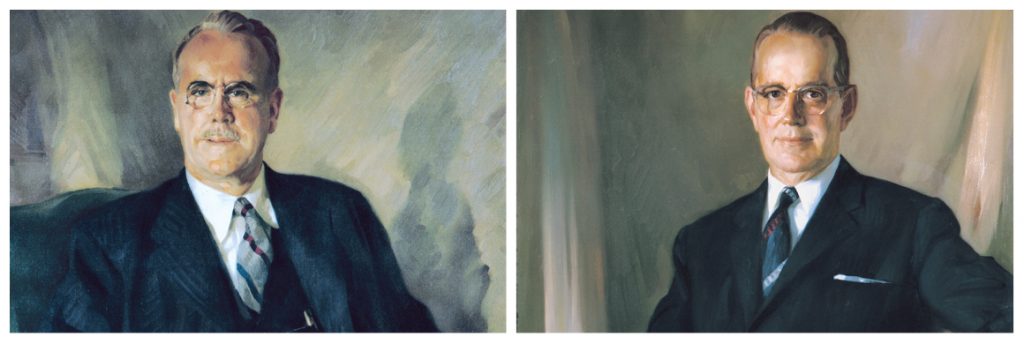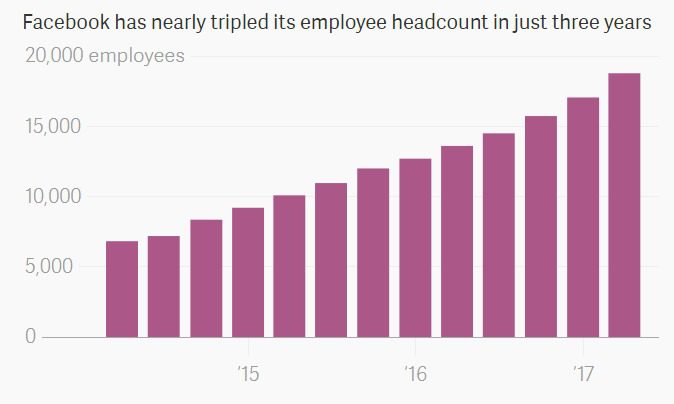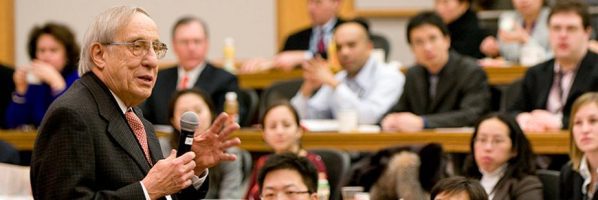The Life and Career of Edwin G. Booz and James L. Allen – Booz Allen Hamilton

Booz Allen Hamilton is one of the world’s largest and most recognizable management consulting firms. Headquartered in McLean, Virginia in the Washington DC metro, the firm boasts 24,225 employees working in more than 80 offices around the globe.
The firm has gone through several name changes in its 100 years of existence, including: Edwin G. Booz, Business Engineering Service; Edwin G. Booz Surveys; Edwin G. Booz and Fry Surveys; Booz, Fry, Allen & Hamilton; Booz, Allen & Hamilton; and finally Booz Allen Hamilton. Today, we’ll focus on two of those names, and the men behind them: Edwin G. Booz and James L. Allen, both Northwestern University Kellogg School of Management graduates.
Early Upbringing and Education
Born in Reading, PA in 1887, Edwin George Booz obtained his Bachelor’s degree in economics in 1912 and his Master’s degree in psychology in 1914 from the Kellogg School of Management. After earning his Master’s, Booz founded Booz Allen Hamilton in 1914 in Chicago, originally under the name The Business Research Service.
However, he was drafted into the Army as a private due to World War I in September 1917, and rose to the rank of major. He worked with the War Department in Washington DC to reorganize the business methods of its various bureaus.
Booz left the Army in March 1919 and returned to his business, servicing bankers, manufacturers, advertising agencies, wholesalers, sales managers, publishers, real estate operators, and other enterprises. He would go on to lead the firm as its chairman until 1946, and continued to work part-time for clients and to mentor the next generation of leaders until his death in 1951.
Meanwhile, James L. Allen was born November 21, 1904, in Somerset, Kentucky. He was raised on a farm, educated in public schools, and graduated from Somerset High School in 1921. In 1922, he left the small town for Chicago where he worked at several jobs and attended night school. Allen graduated in 1929 with a B.S. degree in Economics from the Kellogg School of Management.
After graduating, Allen joined Booz’s firm, Edwin G. Booz Surveys, in 1929. He was named a partner in 1936, and focused on developing business strategy, personnel, and organization studies. In the early ’40s, Allen and Booz worked for the U.S. Military leading up to World War II.
Allen was named chairman of Booz Allen Hamilton in 1946, and held that position until 1970. During this time, the firm enjoyed steady growth as it increased its number of partners, staff, and locations. He was named honorary chairman in 1970 and remained involved with Booz Allen Hamilton until his death in 1992.
CHECK THIS OUT: How Chicago Business Schools are Helping Low-Income Students
About the Company
Booz Allen first went public in 1970 with an initial offering of 500,000 shares at $24 per share. In 1976 public trading ceased after Booz Allen’s partners bought back stock in the largest-ever leveraged buyout involving a consulting firm. Years later, in 2007, managing director Marc Gerencser explained that being privately held allowed the firm to consider long-range investments that companies beholden to shareholders might not be able to make.
In June 2012, Booz Allen expanded its operations in North Africa and the Middle East, bringing offices to countries like Kuwait, Oman, Qatar, and the United Arab Emirates. Booz Allen specifically helped the Government of the United Arab Emirates a sort of National Security Agency for that country. The New York Times reported that the company “profits handsomely from its worldwide expansion.”
In 2014, Booz Allen Hamilton Holding Corporation was awarded a “Top 2014 Workplace” by the Washington Post.

Legacy
Edwin Booz’s name is immortalized as the only name to remain with the firm from its humble beginnings through today. He believed that he could help companies prosper by bringing them “a human touch” and insisted that “people, not products” were the focus of work. This approach gave birth to the modern management consulting profession.
Meanwhile, Jim Allen’s legacy lives on at the Kellogg School of Business at the James L. Allen Center. According to Kellogg, the Center hosts more than 6000 executives each year for one or more of the school’s 160 executive education programs. Considered “an academic retreat,” the Allen Centers offers living and learning spaces to the Kellogg community. Technologically enabled classrooms and comfortable gathering and group study spaces facilitate peer learning and informal interactions among faculty and participants. Additional amenities include indoor workout areas and outdoor exercise programs along the Lake Michigan shoreline provide opportunities for the occasional (and necessary) break and breather.
Facebook Tops Glassdoor’s 100 Best Places to Work List

Employer review website Glassdoor, which allows users to read anonymous employee testimonials about employers, has revealed its annual “Best Places to Work” list, with familiar MBA recruiters Facebook, Bain & Co, and Boston Consulting Group (BCG) earning the top three spots.
Why Facebook?
Since 2011, the social media empire has been one of Glassdoor’s most praised companies to work for, earning a top five spot seven out of the past eight years, including three number one overall awards. Facebook employees are often given extensive benefits, including four months of paid maternity leave—a policy often considered a luxury in the U.S., which has no legally mandated paternity leave policies for employers. As well, earlier this year, Facebook COO Sheryl Sandberg announced the company would implement paid sick time for employees and family members.
With increasing revenue streams, the company’s hiring numbers have continued to swell, with nearly 19,000 employees as of earlier this year—a 38 percent jump from March 2016 to March 2017. In fact, just this week, the company announced it will be adding 800 more jobs at its new London office.

Data via Facebook, graphic by The Atlas/via Quartz.
Of course, the central pitch to work at the social media monolith may be predicated on the payment of employees. According to Paysa, the average Facebook salary is north of $250,000 annually, combining base pay, bonuses, and equity. Most jobs at the company start at, at least, $70,000 USD annually, with business management roles starting at $135,000.
The company has also made a concerted effort at diversifying its hiring. Speaking with Forbes, Lori Goler, vice president of people, said, “Diversity is critical to our mission at Facebook, because we serve a community of 2 billion around the world, and of course there’s diversity in that community.”
The company, according to Forbes, employs between 33 and 35 percent women, and there has been considerable gains among women employed with computer science and engineering backgrounds, as well as a 500 percent increase in employment among those of African descent since 2014. In the interview, Goler added, “We’re nowhere near where we want to be, but we’re at least hearted to see that at least we can make some progress.”
Check out Facebook’s graduate student recruitment page here.
Consulting Companies Still Reign
While certain statistics indicate a wave of MBA grads may be leaving consulting in favor of tech-centric employers, as evident by the recently released Northwestern University Kellogg School of Management employment report, consulting companies are remain one of the primary targets for MBA students and graduates, and for good reason.
Bain & Co., like Facebook, has been endlessly praised by Glassdoor reviews, ranking among the top four best places to work every year since 2009. Like most of the companies on the year-end list, Bain offers ample benefits, including several months of paid maternity leave, comprehensive vacation and insurance policies, and one of the world’s best 401K offers. Fellow Boston metro company BCG also officers a considerable parental leave benefits package, retirement planning, and lofty salaries.

Inside the New York City BCG office/Photo via BCG.
Like Bain, BCG makes a concerted effort to bring in incredibly comparable MBA graduates, recruiting students from multiple prominent business schools like The Wharton School, NYU Stern, Columbia Business School, and many more.
Some Traditional Companies Remain Steady, While Giants Like Apple Stumble
Tech empire Google, not surprisingly, held its place among the top 10 companies—having never fallen lower than eighth overall since 2012. Just outside of the top ranking companies, McKinsey & Co. stayed within the top 20, while other notable heavyweights like Microsoft (39th), Capital One (69th), Deloitte (77th), Accenture (83rd), and Apple (84th), the world’s most successful consumer company, fell to the lower ends of the list.
Despite having the second most profitable year in company history, falling shortly behind it’s 2015 figures, Apple has been steadily dropping down Glassdoor’s annual Best Of list, posting its worst standing in the history of the ranking—nearly 50 spots worse than last year’s ranking of 36th overall.
Considering, however, that the annual ranking is comprises of over 500,000 companies, this drop may not be as serious as it would appear. The overall Glassdoor rating for Apple was 4.3, in contrast to Facebook, which boasts a current 4.6 rating. The average Glassdoor rating for employers, for context, is 3.3.
Some Surprises
Not every company included in the Glassdoor Best Of list could be considered a traditional MBA recruiters, including beloved U.S. west coast fast food chain In-N-Out Burger (fourth overall), growing athletic leisurewear empire Lululemon (sixth), wine company E. & J. Gallo Winery(14th), Delta Airlines (17th), and The Church of Jesus Christ of Latter-day Saints (19th), which provides “Excellent dental and medical coverage,” according to an anonymous employee. Plus, “you work with people who don’t swear.”
For a more extensive overview of the methodology behind the ranking, click here.
Don Jacobs, Visionary Former Kellogg Dean, Passes Away at 90

Some sad news out of Northwestern University’s Kellogg School of Management — Don Jacobs, Kellogg’s dean from 1975 until 2001 and professor of finance since 1957, recently passed away. Continue reading…
Getting Your Money’s Worth: The Return on Investment of the Chicago MBA

Although a growing number of business schools throughout the country are offering part-time or Flex MBA programs, many ambitious business students still choose to pursue their education full-time. However, the often high price of tuition combined with two years of lost income can be a huge deterrent in students choosing a full-time MBA program.
Although the thought of taking two years off from a career may be daunting—especially when it comes to a quickly growing city like Chicago—prospective MBAs should also keep in consideration one of the benefits of having an advanced degree: a salary bump. Considering this, students can better evaluate the true return on investment (ROI) program full-time MBA and make smart decisions about where their money will go farthest.
Don’t let the high price tags of MBA programs in a major business city Chicago scare you away. Below are the Chicago business schools that offer students the best ROI.
Kellogg School of Management – Northwestern University
Northwestern University’s Kellogg School of Management boasts one of the highest ROI’s in the world, ranking fourth overall among the world’s best business schools on Forbes recently released list of the best full-time MBA programs in the U.S. Forbes‘ ranking is weighted specifically by how well compensated graduates are several years after earning an MBA.
Forbes ranking notes that 2012 MBA graduates are now making an average of $84,800 in their return on investment. While several business schools will often have a higher-level of compensation for in-state residents because of tuition differences, Kellogg tuition rates remain constant for both in and-out-of-state applicants. On average, students earn around $80,000 per year prior to enrollment, which increased to an astounding average of $196,000 just last year. Most grads pay their entire tuition back less than four years after graduating.
YOU MAY ALSO LIKE: Kellogg Launches 10 New Courses
Booth School of Business – The University of Chicago
In 2016, the Booth School of Business at the University of Chicago topped the ValueWalk list for having the highest return on investment in the world. Comparing the relatively low cost of a Booth MBA (around $65,000-70,000) with graduate salaries of up to $150,000 or more, Booth graduates will have paid for their degree twice over by the time they have completed their first year of work. Booth graduates are also likely to find work quickly—within three months of graduation, 98.4 percent of all MBA graduates had secured job offers. Booth alumni also find many of their post-graduate opportunities through a broad network of alumni and career support at the university. In 2016, the university was responsible for facilitating 75.2 percent of student’s new jobs.
Lake Forest Graduate School of Management
The Leadership MBA at Lake Forest Graduate School of Management current tuition is $55,600 per year. According to PayScale figures, Lake Forest MBA grads earn around $107,000 annually—a difference of over $51,000. Graduates from the LFGSM are spread throughout the globe, living in all 50 states and in 15 countries around the world. Alumni from the MBA program hold positions as CEOs of major companies, elected officials, entrepreneurs, and leaders in a wide variety of industries.
Northwestern Kellogg Launches 10 New Courses

Northwestern University’s Kellogg School of Management has just launched ten new business courses for the 2017-18 academic year, according to a recent press release.
“We are very excited to continue our tradition of curricular innovation at Kellogg, drawing on both the scholarship or our research faculty and our connections with practice,” Senior Associate Dean for Curriculum and Teaching Mike Mazzeo said.
For data-focused business studies, the school has launched the brand new Data Exploration course, taught by finance professor Robert L. McDonald, who says; “It is now common in business to need to analyze large and unwieldy datasets. We moved from calculators to spreadsheets in the 1980s and now we need to move beyond spreadsheets.” The premise of the Data Exploration course, he added, “is that students should be able to work with and analyze raw data from a variety of sources and a variety of forms, using methods that scale. We will use R, which has become one of the dominant tools in data analytics.”
Two new marketing courses have been introduced to the curriculum: Customer Loyalty, taught by Kellogg Senior Fellow Thomas O’Toole; and Ethnographic Customer Insights, taught by adjunct professor Gina Fong. On the latter, Fong notes; “Ethnographic research is not just a way to answer important business questions, but also a way to bring the customer to life inside a company, helping make the decision-making of the company more customer-centric. Knowing the insight into the customer gives the marketer the ability to anticipate what the customer needs and wants—sometimes before he or she are able to articulate it.”
Two new collaboration and leadership programs have been introduced to the MBA curriculum as well, with Strategic Communications for Organizations, arriving next winter, and Leadership Development Models & Practices, which is available now. In addition, three new Public-Private Interface courses have been or will soon be introduced by Kellogg, covering Strategic Perspectives in Nonprofit Management, Social Impact & Technology Innovation, and Decision-Making for Sustainable Business.
As well, Kellogg has introduced courses in Commercializing Innovations and the CEO Playbook for Health System Success course, both of which will be offered in the winter and spring 2018 semesters, respectively.
You can read more about the new offerings at Kellogg here.
Graduate With A Dual MBA Degree at Northwestern’s Kellogg School

When going for that MBA, why not just go for two graduate degrees? That’s possible at Northwestern University’s Kellogg School of Management.
The business school, tucked inside Chicago, offers two dual MBA programs. Some of its graduates have gone on to work for Amazon and Microsoft. Plus, living in Chicago is a bonus.
The Windy City has vibrant arts, food, and comedy scenes, as well as a growing number of traditional career opportunities. Though the state of Illinois is suffering financially, Chicago saw a jump in employment following the Great Recession. The city is also home to headquarters for some of the biggest banks in the country.
Really, isn’t deep-dish pizza all a person needs though? Candidates can enjoy some Chicago-style pizza (if they’re into that kind of thing) while studying hard to achieve that dual degree.
Masters of Science in Design Innovation (MMM)
According to the school, this program is the first of its kind. Graduates walk away with their Kellogg MBA—and a Masters of Science in Design Innovation from Segal Design Institute at the McCormick School of Engineering and Applied Science.
That’s a steal. Especially given that this takes no more than two years. Candidates who want to build a successful business with a strong focus on design should really benefit from this program. Some design tools students learn while at Kellogg include user-centered research methods, prototyping, and implementation.
But every student has a specific interest. The program’s electives allow participants to hone in on whatever skills they need to succeed. These courses can look like programming design or even whole-brain communication.
“The MMM program challenges me to be more dynamic: in thought, in understanding, and in action,” Kellogg student Vikram Raju said on the school’s website.
The Kellogg MMM is a full-time program, offering classes during both the day and evening.
JD/MBA Program
This program is tailored specifically to the business-savvy with an interest in law. The JD/MBA program offers graduates a Masters of Business Administration from Kellogg, as well as a Juris Doctor from the Northwestern School of Law.
Again, Kellogg set an example with this program: It’s the first kind in the U.S. Be it for someone who ultimately wants to do law or someone who wants to hold a unique set of business skills, the JD/MBA program uniquely positions its graduates for the real world. Law firms, corporations, and nonprofits look to Kellogg’s JD/MBA graduates. Some alumni even go onto elected office.
“This program attracts people who are leaders,” JD/MBA student Adina Lord said on the program’s website.
This program takes three years (one year more than the MMM), but it’s worth it. The average student takes five years to achieve these degrees separately.
While working toward the MBA, students can choose an expertise: accounting, economics, and marketing, among others. Then, there’s the legal background on top. And the practice is hands on.
While at Kellogg, students can work with Northwestern’s Entrepreneurship Law Center, Global Lab, or Venture Lab. All these resources give students experience they need to attract future employers. The Law Center connects students with small businesses, where they can give businesses legal and strategic consulting.
